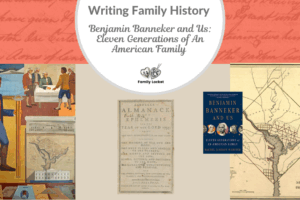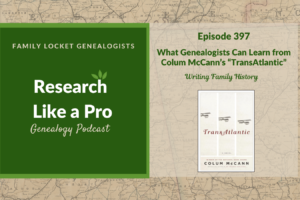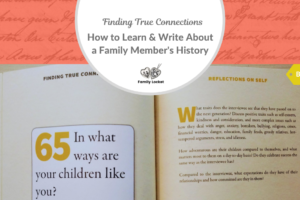
We often have family stories that have been passed down through the generations to us. How much truth is in the story we may never know, but in the novel, The Thread Collectors by Shaunna J. Edwards and Alyson Richman, we have an interesting example of weaving a tale from historical research and a thread of a story. The authors collaborated on this novel. Shaunna has African-American ancestry, and Alyson has Jewish ancestry. They combine their possible family narratives into an account of four individuals – one enslaved couple in New Orleans and the other a Jewish couple from New York. Both men fight in the Civil War for the Union, and the story is told from their perspective as well as that of the women they left behind.
 We’re reading “The Thread Collectors ” for our summer book selection in the Family Locket Book Club on Goodreads. As we consider how we might best tell our family stories, we can gain ideas from reading others’ work. The authors explain their motivation for writing the novel.1
We’re reading “The Thread Collectors ” for our summer book selection in the Family Locket Book Club on Goodreads. As we consider how we might best tell our family stories, we can gain ideas from reading others’ work. The authors explain their motivation for writing the novel.1
The novel is loosely inspired by our own backgrounds and is born from our decades-long friendship as a Black woman and Jewish woman, each proud of their heritage. We wanted to explore the Civil War experience through two underrepresented lenses and illuminate the important and often overlooked tragedies of this era. But we also wanted to show how ingenuity and creativity can bridge cultural divides and create power for the seemingly powerless.
The authors turned to their own family history to create the story. Alyson grew up with stories about two uncles who fought in the Civil War on opposing sides -one for the Union in the 31st New York Regiment and the other in the Confederate 29th Regiment of Mississippi. Shauna wanted to explore how African Americans in this era could have very different experiences. The character of Stella is loosely based on her 4th great-aunt, who became financially independent and a landowner, in contrast to other relatives who struggled to rise above poverty. The authors discuss their family history and writing process in the video “Meet the Author Shaunna J. Edwards & Alyson Richman’s The Thread Collectors.’
Any historical fiction must be grounded in the relevant historical context and thoroughly researched. The authors sought out experts to help them understand the involvement of Jewish individuals in the Civil War. They also sought understanding of the Gullah history and culture, African American handicraft, and antebellum history. We can do the same in our writing. Immersing ourselves in the history, geography, and culture of the time can help bring the story of our ancestors to life.

Enoch Long, photographer (1823-1898), “Unidentified African American Union soldier with a rifle and revolver in front of painted backdrop showing weapons and American flag at Benton Barracks, Saint Louis, Missouri,” Library of Congress; flickr (flickr.com : accessed 27 June 2025).
The Thread Collectors uses the theme of needlework to tie the lives of the Jewish woman, Clara, and the African American woman, Stella, together. Clara, in New York, belongs to a sewing circle that started with quilts but, due to the urgent need of hospitals, converted to making bandages. Stella, enslaved in New Orleans, uses her skill with the needle to stitch maps for men escaping slavery to fight with the Union. She bases her maps on information gleaned from her enslaver during his visits to her cottage. The novel doesn’t shy away from the harsh truths inherent in slavery and depicts the inhumane way the Union Army treated the African American soldiers.
The story of the Civil War from the soldiers’ perspective is told through the Jewish man, Jacob Kline, and the African American, William. Their lives come together through music. Both are gifted musicians and escape the worst of the fighting because of their membership in a small ensemble. Despite that, challenges ensue that test their loyalty, especially that of William.
The Thread Collectors is the perfect summer read – fast-paced and historically unique. Each book we read based on history deepens our knowledge and opens our eyes to what our ancestors may have experienced. The Civil War affected all who resided in the United States at the time in one way or another. If an ancestor fought, we can research the regiment and the battles he might have been in. We can learn about the locations and study the lives of the family at home. How were they affected by their fathers and brothers’ war service? Envisioning the Civil War and the impact it had on our family can be painful, but it can also show the human spirit and ingenuity of survival.
Best of luck in all your genealogical writing!
Sources
- Shaunna J. Edwards and Alyson Richman, The Thread Collectors (Toronto : Graydon House, 2022), author’s note.













Leave a Reply
Thanks for the note!